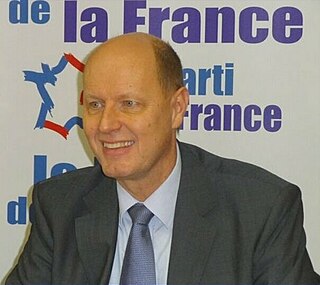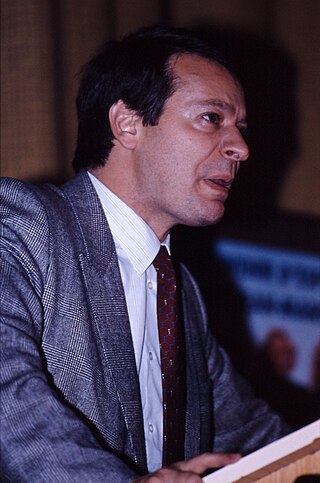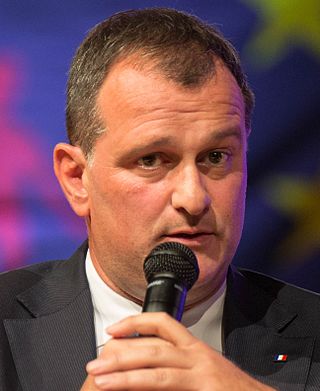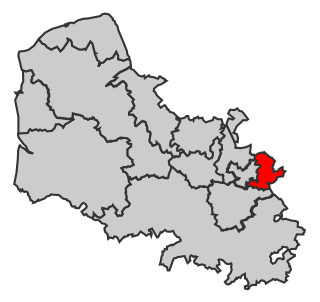The National Rally, known as the National Front from 1972 to 2018, is a French far-right political party, described as right-wing populist and nationalist. It is the single largest parliamentary opposition party in the National Assembly since 2022. Its candidate was defeated in the second round in the 2002, 2017 and 2022 presidential elections. It opposes immigration, advocating significant cuts to legal immigration, protection of French identity, and stricter control of illegal immigration. The party advocates a "more balanced" and "independent" French foreign policy, opposing French military intervention in Africa while supporting France leaving NATO's integrated command. It also supports reform of the European Union (EU) and its related organisations as well as economic interventionism, protectionism, and zero tolerance for breaches of law and order.

Marion Anne Perrine "Marine" Le Pen is a French lawyer and politician who ran for the French presidency in 2012, 2017, and 2022. A member of the National Rally, she served as its president from 2011 to 2021. She has been the member of the National Assembly for the 11th constituency of Pas-de-Calais since 2017. She currently serves as parliamentary party leader of the National Rally in the Assembly, a position she has held since June 2022.

Carl Lang is a French politician and former Member of the European Parliament for the North-West constituency. He was member of the National Front from 1978 to 2008; he is currently president and co-founder of the Party of France.
The far-right tradition in France finds its origins in the Third Republic with Boulangism and the Dreyfus affair. In the 1880s, General Georges Boulanger, called "General Revenge", championed demands for military revenge against Imperial Germany as retribution for the defeat and fall of the Second French Empire during the Franco-Prussian War (1870–71). This stance, known as revanchism, began to exert a strong influence on French nationalism. Soon thereafter, the Dreyfus affair provided one of the political division lines of France. French nationalism, which had been largely associated with left-wing and Republican ideologies before the Dreyfus affair, turned after that into a main trait of the right-wing and, moreover, of the far right. A new right emerged, and nationalism was reappropriated by the far-right who turned it into a form of ethnic nationalism, blended with anti-Semitism, xenophobia, anti-Protestantism and anti-Masonry. The Action française (AF), first founded as a journal and later a political organization, was the matrix of a new type of counter-revolutionary right-wing, which continues to exist today. During the interwar period, the Action française and its youth militia, the Camelots du Roi, were very active. Far right leagues organized riots.

Debout la France is a French political party founded by Nicolas Dupont-Aignan in 1999 under the name Debout la République as the "genuine Gaullist" branch of the Rally for the Republic. It was relaunched again in 2000 and 2002 and held its inaugural congress as an autonomous party in 2008. At the 2014 congress, its name was changed to Debout la France!.

Jean-Pierre Stirbois was a French far-right politician. Elected deputy mayor in 1983 of Dreux, a city of around 30,000 inhabitants at the time, he was one of the main architects, along with his wife Marie-France Stirbois, of the first electoral breakthrough of the National Front.

Louis Aliot is a French politician and the vice president of the National Rally since 2011. A member of the FN Executive Office, Executive Committee and Central Committee, Aliot has been a regional councillor since 1998 and a municipal councillor of Perpignan (2008–2009). Louis Aliot has been the mayor of Perpignan since July 2020.

The Left Front was a French electoral alliance and a political movement created for the 2009 European elections by the French Communist Party and the Left Party when a left-wing minority faction decided to leave the Socialist Party, and the Unitary Left, a group which left the New Anticapitalist Party. The alliance was subsequently extended for the 2010 regional elections and the 2012 presidential election and the subsequent parliamentary election.

The 11th constituency of the Pas-de-Calais is a French legislative constituency in the Pas-de-Calais département. It elects one député to the National Assembly. It has been represented by Marine Le Pen since 2017.

Nicolas Bay is a French politician and Member of the European Parliament (MEP) from France. He served as General Secretary of the National Front from 2014 to 2017. He has served as a Regional Councillor for Normandy since January 2016, having previously served as a Municipal Councillor for Elbeuf from 2014 to 2015.

Legislative elections were held in France on 10 and 17 June 2012 to select the members of the 14th National Assembly of the Fifth Republic, a little over a month after the presidential election run-off held on 6 May.

Marion Jeanne Caroline Maréchal, known as Marion Maréchal-Le Pen from 2010 to 2018, is a French politician who has served as a Member of the European Parliament (MEP) since 2024. She is part of the Le Pen family, as the granddaughter of National Front founder Jean-Marie Le Pen and niece of its later leader Marine Le Pen.

Florian Philippot is a French politician. He served as Vice President of the National Front from 2012 to 2017 before quitting the party to found The Patriots in September 2017, which has failed to win any representation in subsequent elections.

Legislative elections were held in France on 11 and 18 June 2017 to elect the 577 members of the 15th National Assembly of the Fifth Republic. They followed the two-round presidential election won by Emmanuel Macron. The centrist party he founded in 2016, La République En Marche! (LREM), led an alliance with the centrist Democratic Movement (MoDem); together, the two parties won 350 of the 577 seats—a substantial majority—in the National Assembly, including an outright majority of 308 seats for LREM. The Socialist Party (PS) was reduced to 30 seats and the Republicans (LR) reduced to 112 seats, and both parties' allies also suffered from a marked drop in support; these were the lowest-ever scores for the centre-left and centre-right in the legislative elections. The movement founded by Jean-Luc Mélenchon, la France Insoumise (FI), secured 17 seats, enough for a group in the National Assembly. Among other major parties, the French Communist Party (PCF) secured ten and the National Front (FN) obtained eight seats. Both rounds of the legislative election were marked by record low turnout.

Presidential elections were held in France on 10 and 24 April 2022. As no candidate won a majority in the first round, a runoff was held, in which Emmanuel Macron defeated Marine Le Pen and was re-elected as President of France. Macron, from La République En Marche! (LREM), had defeated Le Pen, leader of the National Rally, once already in the 2017 French presidential election, for the term which expired on 13 May 2022. Macron became the first president of France to win a re-election bid since Jacques Chirac won in 2002.

Caroline Fiat is a French medical caregiver and politician who represented the 6th constituency of the Meurthe-et-Moselle department in the National Assembly from 2017 to 2024. From 2022 to 2024, she held one of the National Assembly's six vice presidencies. Fiat is a member of La France Insoumise, having previously been an activist in the French Communist Party.

The Jeanne Committees is a far-right political party founded by Jean-Marie Le Pen after his exclusion from the National Front in France in 2015.

Karim Ouchikh is a French politician. He is the current vice-president of the National Council of European Resistance, a far-right pan-European political group.
Mathilde Androuët is a French politician. She was elected as a National Rally Member of the European Parliament (MEP) in the 2019 European parliamentary election. She was re-elected in 2024.

Reconquête, stylized as Reconquête!, is a ultra-nationalist political party in France founded in late 2021 by Éric Zemmour, who has since served as its leader. He was a far-right candidate in the 2022 presidential election, in which he placed fourth with just over 7% of the vote as the best newcomer.

















